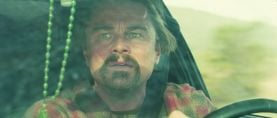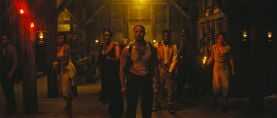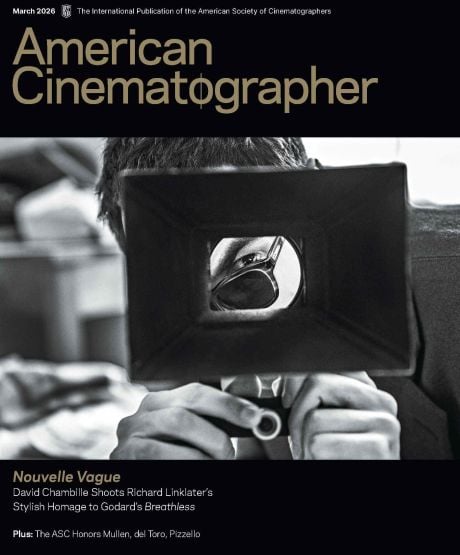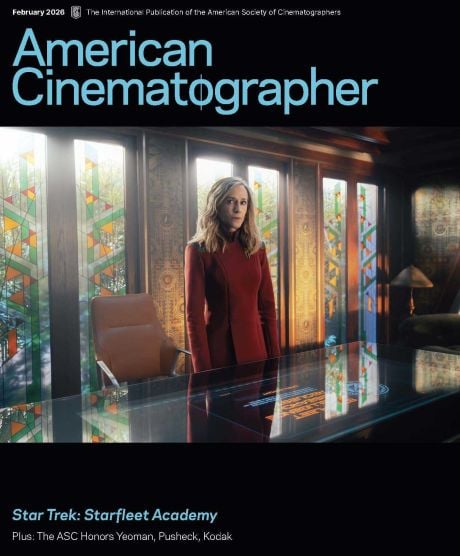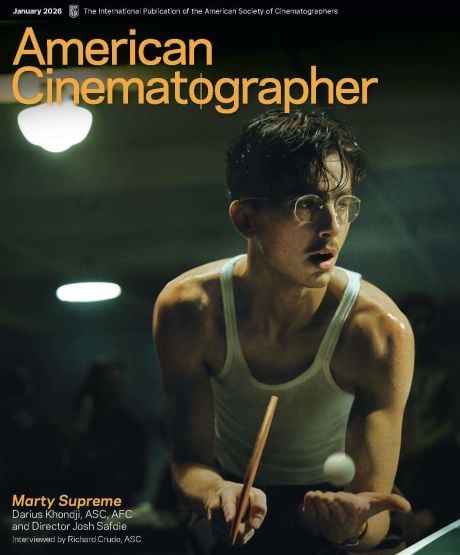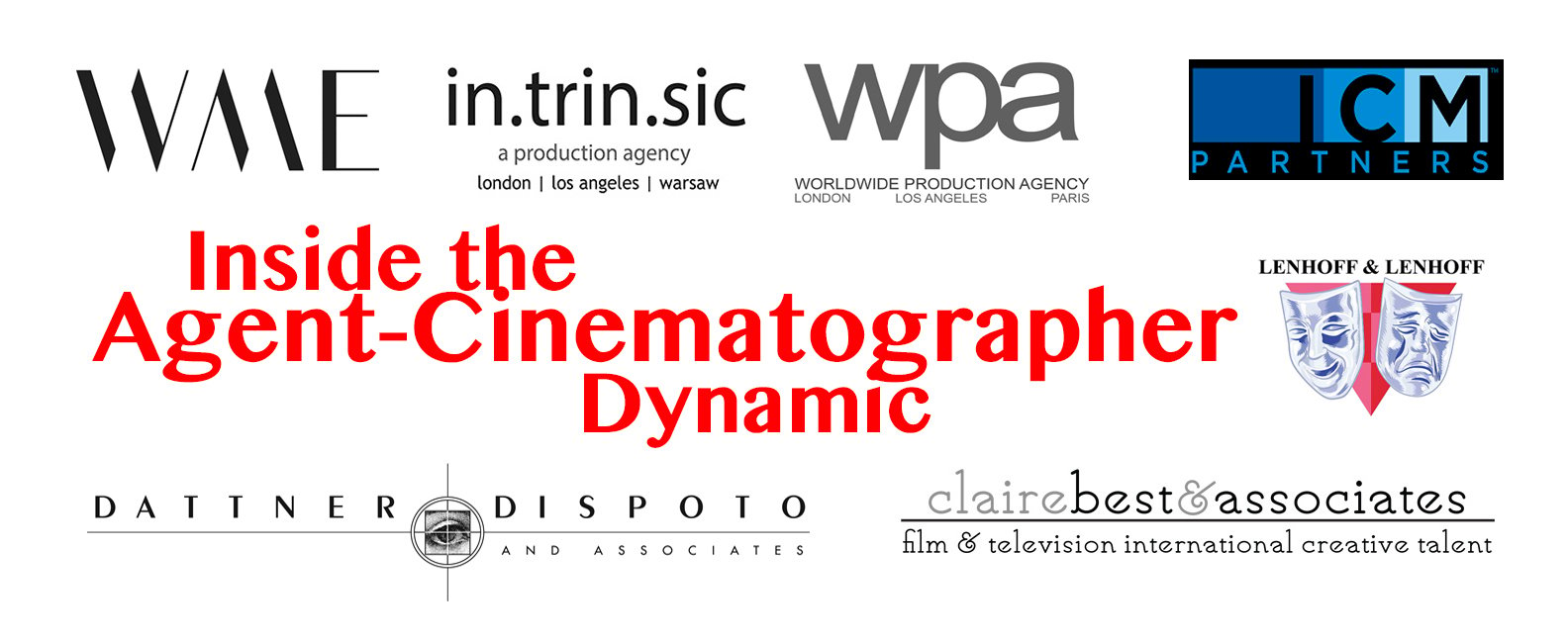
Inside the Agent-Cinematographer Dynamic
To complement our spotlight report on 10 “Rising Stars of Cinematography,” AC spoke with an array of talent agencies that specialize in representing directors of photography.
To complement our spotlight report on 10 “Rising Stars of Cinematography,” AC spoke with an array of talent agencies that specialize in representing directors of photography about the cinematographer-agent relationship. Here, the agents interviewed share their advice for those who aspire to a career behind the camera.
Claire Best, Claire Best and Associates

“We don't pigeonhole our clients into commercials or features or TV. We look at the broad spectrum and try to build on the best elements they have to broaden their horizons. We also work very carefully with them to figure out how their résumés are going to look, because the biggest mistake for clients is to do too many of one kind of film. If we have a client who's done period films, we try very hard to mix that up with contemporary thrillers or sci-fi or something else so that they're not the go-to person for only one kind of project.
“A lot of our job is convincing the people to whom we're selling talent to look beyond the obvious. It’s common when you're looking at a résumé to look for the kind of credit that says the client has done this kind of film already, therefore that's the person for the job. As a client, though, what you've already done is not what you'd necessarily want to do again, so our job is to try to help the producer, director and executives see beyond the résumé and point things out that make them look again and think beyond the obvious. It's helping them connect the dots.
“Cinematographers have to know how to read scripts and weigh all the different factors. One of the biggest challenges for a cinematographer is a script with a certain setting, but the production is going to shoot in a different location for that setting. You have to ask yourself, ‘Is that really possible? Is the audience going to buy that?’
“Agents also have to give their clients the confidence to stand up and be counted when they feel creatively that something is not the right way to go. With newer clients who maybe don't have that confidence, part of the agent's role is to be the person with whom to have an off-site discussion; the agent, standing one step back from it all, can give the clients some guidance as to what they might say to the line producer, the first A.D. or the director to put forward their point of view.
“Diplomacy is really important. The cinematographer, after the director, is the most prominent person on the set, and their personality has a vibe that spreads throughout the set. If cinematographers are easy-going and diplomatic and comport themselves professionally, that sets the tone. If the cinematographer is upset, then everyone else gets upset and nervous, from the actors and actresses to the rest of the crew. The cinematographer and the first AD are the lynchpins between the director and the rest of the cast and crew.”
Bill Dispoto, Dattner Dispoto and Associates

“For young cinematographers, there's a bit of anxiousness about finding an agent and becoming a star immediately, but it's important for people to really hone their craft and their art, and not get ahead of themselves. There's usually a point when it's time to get an agent. When does that person have just enough material that they're ready to be exposed to the community?
“The challenge is catching somebody new right at that turning point. The production community is impacted with a lot of talented people, and if you go out there and expose your work too soon, before you're ready, you might not get your opportunity for a while. You want your first exposure to be special.
“A lot of it is personality, too. When you have a combination of personality and talent, with enough work that’s special and unique and defines you as an artist, that’s when a career can take off.
“Our role as agents is to actively find clients work and help them decide on the right work. Not everybody has the same goal. The first step for me is getting to know who the artist is so that I can help guide the path. Some people want to make a lot of money and do big movies; other people are art-based, and they have to be passionate about a project to want to do it. I figure out who the clients are, and I build from there.
“There are reasons to do a film that might not be about the script. The material is key, but if something is reasonably good and you’ve got a special director who’s managed to get a great cast, it’s probably worth it. Or if it’s an amazing script with an unknown director, then maybe that’s worth the gamble. You have to look at all the pieces and help the client make a decision based on all the variables.
“As a cinematographer, focus on your craft first. Get to know who you are as an artist. It's easy to jump the gun and say, ‘Okay, I've been shooting for six months — I have to get an agent!’ Maybe you're ready after six months, or maybe you're not going to be ready for three years. The first thing you want to focus on is who you are as an artist so when you do start meeting agents and getting out in the community, you're bringing something to the party that's special and unique.”
Paul Hook, ICM Partners

“If an agent does a great job with a cinematographer and the cinematographer is really talented, then it clicks and the cinematographer gets lots of work. Then it becomes about managing that work. It's as hard to break out a talented unknown as it is to keep someone on top by trying to make the most effective choices and have him or her work with the most interesting filmmakers.
“There are different variables that go into why somebody should or should not take a job. First and foremost, it has to be about the director and the story. Then there's, ‘Who's producing? Who's financing? Will those relationships benefit me in terms of more opportunities in the future?’ The producer can be as effective as a really great director. In the end, it comes down to, ‘Which is the movie that's going to change my world and the audience's world?’
“Clients want me to tell them the truth. They want to know I’m consistent and steady and honest and smart and clever. There are times when the cinematographer might not see something so I point it out, or I may not see something and they point it out. It's very collaborative. I'm in a relationship with our clients. It's not just booking people — we're not booking agents.
“Cinematographers need to master the political agenda. You're dealing with people all day long when you make films, and your talent will stay in a box if you don’t figure people out — a director or a producer who doesn’t know what they want or communicates in a way you’re not used to. It’s more than just your art; it’s a collaborative medium, and you’re dealing with different people and different scenarios, schedules, budgets and conditions. There are so many variables that go into it. You have to be able to adapt and figure it out.
“Ultimately it's all about who you are, the job that you do, and the way you treat people in the business. How you communicate and carry yourself establishes a reputation for who you are. Pursue excellence and ignore success.”
Charles Lenhoff, Lenhoff & Lenhoff

“A typical day for me involves surveying the marketplace: seeing who's working, who's not, what opportunities are out there, and trying to marry the client's goals with the opportunities. There are anywhere from two to 20 people involved in the approval and hiring of the cinematographer. It oftentimes includes the creator of the show, the director, the line producer, the non-writing producers — even the talent managers sometimes get involved. It involves the studio, the production company, and the network creative and production executives.
“My role is to be the cheerleader. I protect the clients’ business interests. I try to preserve their earning curve and keep it on an upward trajectory. I'm acutely aware of that great fiduciary responsibility. It’s their livelihood they're placing in my hands, and I respect that tremendously.
“Most of the time the clients rely upon me to give them advice on which show they should take. That's based upon reading the script, knowing the people, etc. It's just an instinct. You go into a market and you smell around and you know where the good stuff is and where the bad stuff is.
“Then there's the part where there's only one opportunity and we ask, ‘Do we take it or do we hold out?’ Oftentimes in being perceived as a cinematographer in demand, working is more important than holding out for the perfect job. So there's an artistic side that has to be balanced with the business side.
“It’s a partnership. We’re in the same two-man canoe. We have to be in sync and operate in tandem to move smoothly through calm waters and through rapids. I have to find what works for each client and tailor that; it’s not just one-process-fits-all. Some clients are great communicators; others need help in the promotional area, selling their personality and selling their artistry. A lot of cinematographers disdain self-promotion, and that’s why they need an agent.
“It's incumbent upon the young, up-and-coming or emerging cinematographers to control how they are perceived. They want to have a great reputation for being fast, with very strong artistry, and being easy and wonderful to deal with. They have to have those skills completely honed to have a sustainable career. Being a working cinematographer today is fraught with politics; what’s music to my ears is when everybody says we love your client because they're fast, their artistry looks fantastic, and they're so easy to work with.”
Ann Murphy, ICM Partners

“When you’re starting out, it’s about concentrating on your work. Don’t spend the majority of your day trying to find an agent. Try to find projects, and artists to work with, and do some really good work. Do something special so the agents are the ones after you. We’ll find you when it’s time.
“I want to help my clients find work, but I also want to help them craft a career. I'm not a booking agent. I'm someone who wants to look at someone and at that person’s goals — and those goals are going to change. What someone wants now versus five years from now can be different, so it's my job to help craft the career that the client wants and put the client in a position where he or she will have choices. You can go from movie to movie, but at some point if you only keep doing big comedies, you're never going to get your Birdman, or it's at least going to be a lot harder.
“Sometimes a project will come in and the client will say, ‘Oh, I don't know. It's too small.’ And I’ll say, ‘You need to read the script because the script is good, and look at the producers who are involved — they've also produced these movies.’ There are certain people who are tastemakers in this industry.
“So it's my job to help people get jobs, but at the same time it's also to give them advice, to listen to them, to be there when they have problems. I guide them through the politics of the set, the producers and the directors.”
Shari Shankewitz, WME

“I open one eye at 5:45 a.m. and start checking and responding to emails. Because of the time difference, I find that the mornings are critical for me in terms of the clients and business we have in Europe. If I can weather the first few hours of craziness, I am free in the early afternoon to meet with clients, help them update and redesign websites, make set visits, etc. Also, being at a big agency allows me to get involved in projects outside my normal job parameters. There is always a screening to go to in the office, or a director will come in for a meeting and I’m asked to join. My day doesn’t ever truly end; it just transfers back to my cellphone when I leave the office.
“My role is not only to find work and make introductions, but also to help navigate the cinematographer’s career to ensure longevity. As a commercial and music-video agent, I am a client’s first point of contact. When we sign someone on the commercial side, it is assumed they will grow into a feature client and work fluidly on both sides, with a team in place for narrative. There has to be a strategy, and every client requires different things. I hope to be there as a collaborator, helping the client pick the right narrative opportunities and balancing these decisions in relation to the commercial world. Does the movie make sense in the long run to take him away from his consistent commercial directors, or will this commercial director bring narrative opportunities? These are the conversations that I like to be engaged in when working with a client.
“If you speak to any cinematographer, they all have a story about a project they turned down that turned out to be a massive hit. It’s easy to get stuck on it, but you can’t. Sometimes it’s the agent who is either short-sighted or overly excited; sometimes it’s the client. We just have to take responsibility for the error in judgment and move on.
“There seem to be trends in the way agents find talent and vice versa. Back in the day, you’d watch a music video and think, ‘Oh, that guy is shooting cool stuff — who is he?’ Now there are atypical media platforms for discovering talent: YouTube, sites dedicated to cinematography, and films or pilots on Netflix, Amazon, etc. Cinematographers have a better shot at demonstrating their art.
“Always present your work as if it’s the only shot you’ll ever have, in a clean, easy-to-navigate way, with important directors highlighted and music to complement the images. Most importantly, show only the best work. Imagine that every viewer only has five minutes to see what best demonstrates who you are and what you are capable of. Make it count.
Jonathan Silverman, Intrinsic

“If you’re a young cinematographer, going to events like the ASC Awards or Sundance to talk to people is smart. Meeting young producers is a good way to make connections — you may start out as friends first, then land a job later. It’s like the old chicken-or-egg question: What comes first, the agent or the project? Often it’s the project, so how do you get the project? Socializing. You need to make the contacts.
“There are some cinematographers whose talent may be no better than the next person’s, but they still rise to the top because people like them. As agents, we have to sell your disposition as well as your talent. Do the producer and director want to see your face every day at 7:30 in the morning? We often look for people who aren’t divas — that can be career suicide when you’re starting out.
“We know the DPs in this business who are social or political animals, and I don’t say ‘political’ in a bad way — they just know how to work the system. Those particular guys and gals often rise right to the top because people want to work with them.
“From an agent’s perspective, the ideal client might be 50 percent talent and 50 percent ‘good in the room.’ We can get them in the room for a meeting, but they have to take it from there. When you have a client with talent plus good energy and a good personality, you can feel a producer’s excitement over the phone: ‘Hey, we’re really excited to meet.’
“I often know ahead of time how many DPs are up for a given job, so I can scale my client’s expectations. They might be going in as a dark horse, but dark horses sometimes win. If they have a shy or closed personality, though, they may go in as the lead horse but come out of the meeting not getting hired — and when that keeps happening, it’s a problem. Quite often in those situations, they would have gotten the job if they had any kind of ‘game,’ so that social part of the process is very important.
“In the opposite situation, you may have a client with good but not crazy-amazing talent; they might have A-minus talent instead of A-plus. But if they’re engaging and interesting, they may go into the meeting with an artistic vision that impresses everyone. A producer may be more concerned with how fast you work, but a director is looking for your artistic level and technical expertise. So that person who’s the A-minus — who goes into the meeting somewhere in the middle of the group — sometimes comes out with the job. That’s reality.”
Kristen Tolle-Billings, Worldwide Production Agency

“I don't necessarily encourage you to find an agent until you really need one — and usually you know when you need one. Just focus on doing the creative work you really like. Focus on what you're able to curate for yourself, and distinguish yourself with that. The agent thing usually sorts itself out when it's supposed to.
“You don't want to force anybody to take a project; you can only give your opinion or your perspective. That's what you're there for. Everything is based on, ‘Is this the right project for the client?’ You have to take the money away and look at the creative aspects, the client, and the director. That's usually what I take into consideration. We work as a team, and each client has a team of people behind them, and we're all usually involved in the decision-making.”
Louiza Vick, Worldwide Production Agency

“It's ultimately up to the creative producers and the director to decide who's the right person for a job. We're the matchmakers. We're the ones trying to understand the intangibles — the creative aspects and the logistical aspects — and trying to match what the buyer wants and what the client wants. From there it comes down to a discussion the client has with the director and the creative producers. Was there a connection made?
“I see myself as a manager. We at WPA have a hands-on approach. It’s about strategizing, and talking through different opportunities, and figuring out which is the right one. Getting the work is a team effort, and it becomes more and more so as the relationship continues. You want to find good people with good material for each client with whom they hopefully formulate long-lasting relationships. There are going to be times where we bring an opportunity to the client, and then there are other times where the client will bring an opportunity through a contact. At the end of the day we decide as a team what is the right thing to do.
“When you’re building your body of work, be mindful of what you want to say, and craft your own point of view by identifying the filmmakers you want to work with, maintaining those relationships and building a portfolio with them. Sometimes cinematographers are too focused on getting as much done as possible, and they lose sight of quality. Think about what drives you as an artist, and then work on translating that into your body of work.
“It's extremely important to create a well-crafted, easy to navigate website that reflects the artist's personality. Cinematographers should be using social media to get themselves out there and to showcase their eye and their style. That's becoming increasingly important.
“As far as getting an agent, have someone you’ve worked with in the past reach out to an agent on your behalf, whether it's a director, producer or executive. That comes off much better, and people take it more seriously than cold-calling. At the same time, though, if you’ve done your homework and you feel a particular agency is a good fit, then reach out, because you never know. Keep your email brief, to the point, and not general. It has to have a personal touch. It's very easy to tell if it's just a blanket email that's being sent out to 10 different places.”
